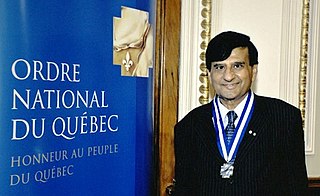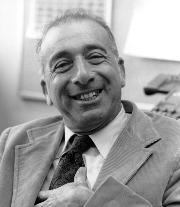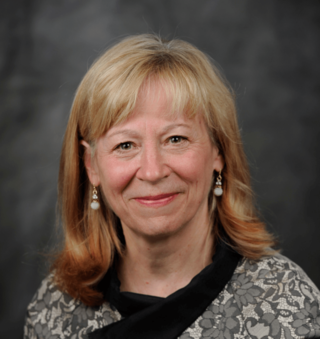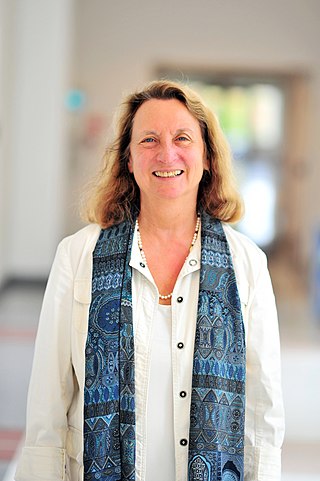
Denis James Evans, is an Australian scientist who is an Emeritus Professor at the Australian National University and Honorary Professor at The University of Queensland. He is widely recognised for his contributions to nonequilibrium thermodynamics and nonequilibrium statistical mechanics and the simulation of nonequilibrium fluids.

William Esco Moerner, also known as W. E. Moerner, is an American physical chemist and chemical physicist with current work in the biophysics and imaging of single molecules. He is credited with achieving the first optical detection and spectroscopy of a single molecule in condensed phases, along with his postdoc, Lothar Kador. Optical study of single molecules has subsequently become a widely used single-molecule experiment in chemistry, physics and biology. In 2014, he was awarded the Nobel Prize in Chemistry.

Sir David Charles Clary, FRS is a British theoretical chemist. He was president of Magdalen College, Oxford, from 2005 to 2020. He was the first chief scientific adviser to the Foreign and Commonwealth Office from 2009 to 2013. He is a Professor of Chemistry at the University of Oxford.

Atta-ur-Rahman, h-index 75, with 36,000 citations is a Pakistani organic chemist and is currently serving as Professor Emeritus at the International Center for Chemical and Biological Sciences at the University of Karachi and as Chairman of PM Task Force on Science and Technology. He has twice served as the President of Pakistan Academy of Sciences. He was the Federal Minister of Science and Technology (2000-2002), Federal Minister of Education (2002) and Chairman Higher Education Commission with status of Federal Minister (2002-2008) He is also the President of the Network of Academies of Sciences in Countries of the Organisation of Islamic Countries (NASIC). After returning to Pakistan from Cambridge after completing his tenure as Fellow of Kings College, Cambridge University, he contributed to the development of the International Center for Chemical and Biological Sciences at the University of Karachi, and transforming the landscape of higher education, science and technology of Pakistan. He is Fellow of Royal Society (London), Life Fellow of Kings College, Cambridge University, UK., and Professor Emeritus at University of Karachi

Arieh Warshel is an Israeli-American biochemist and biophysicist. He is a pioneer in computational studies on functional properties of biological molecules, Distinguished Professor of Chemistry and Biochemistry, and holds the Dana and David Dornsife Chair in Chemistry at the University of Southern California. He received the 2013 Nobel Prize in Chemistry, together with Michael Levitt and Martin Karplus for "the development of multiscale models for complex chemical systems".

Daan Frenkel is a Dutch computational physicist in the Department of Chemistry at the University of Cambridge.
Ruth Marion Lynden-Bell, FRS is a British chemist, emeritus professor of Queen's University Belfast and the University of Cambridge, and acting President of Murray Edwards College, Cambridge from 2011 to 2013.

Ashok K. Vijh, is an Indian born Canadian chemist. He was born in Punjab but moved to Canada in 1962.
Jean-Pierre Hansen FRS is a Luxembourgian chemist and an emeritus professor of the University of Cambridge.

Sir Anthony Kevin Cheetham is a British materials scientist. From 2012 to 2017 he was Vice-President and Treasurer of the Royal Society.

Berni Julian Alder was a German-born American physicist specialized in statistical mechanics, and a pioneer of computational modelling of matter.
Sauro Succi is an Italian scientist, internationally credited for being one of the founders of the successful Lattice Boltzmann method for fluid dynamics and soft matter.

Mohan Rao Chintalagiri is an Indian molecular biologist renowned for his contributions to the fields of biophysics and molecular biology. He has earned international recognition for his work on molecular chaperones as well as his contribution to the field of photoacoustic spectroscopy in health and disease. He is a former Director of the Centre for Cellular and Molecular Biology (CCMB) and served as a CSIR-Distinguished Scientist. He received the Shanti Swarup Bhatnagar Prize in 1999, the highest science honor in India.

Geraldine Lee Richmond is an American chemist and physical chemist who is serving as the Under Secretary of Energy for Science in the US Department of Energy. Richmond was confirmed to her DOE role by the United States Senate on November 5, 2021. Richmond is the Presidential Chair in Science and professor of chemistry at the University of Oregon (UO). She conducts fundamental research to understand the chemistry and physics of complex surfaces and interfaces. These understandings are most relevant to energy production, atmospheric chemistry and remediation of the environment. Throughout her career she has worked to increase the number and success of women scientists in the U.S. and in many developing countries in Africa, Asia and South America. Richmond has served as president of the American Association for the Advancement of Science, and she received the 2013 National Medal of Science.

Elaine Surick Oran is an American physical scientist and is considered a world authority on numerical methods for large-scale simulation of physical systems. She has pioneered computational technology to solve complex reactive flow problems, unifying concepts from science, mathematics, engineering, and computer science in a new methodology. An incredibly diverse range of phenomena can be modeled and better understood using her techniques for numerical simulation of fluid flows, ranging from the tightly grouped movements of fish in Earth's oceans to the explosions of far-flung supernovae in space. Her work has contributed significantly to the advancement of the engineering profession.

Emily A. Carter is the Gerhard R. Andlinger Professor in Energy and the Environment and a professor of Mechanical and Aerospace Engineering (MAE), the Andlinger Center for Energy and the Environment (ACEE), and Applied and Computational Mathematics at Princeton University. She is also a member of the executive management team at the Princeton Plasma Physics Laboratory (PPPL), serving as Senior Strategic Advisor and Associate Laboratory Director for Applied Materials and Sustainability Sciences.

Ganapati Dadasaheb Yadav is an Indian chemical engineer, inventor and academic, known for his research on nanomaterials, gas absorption with chemical reaction and phase transfer catalysis. He served as the vice chancellor of the Institute of Chemical Technology, Mumbai from 2009 until November 2019. He is currently the Emeritus Professor of Eminence at ICT Mumbai.

Biman Bagchi is an Indian scientist currently serving as a SERB-DST National Science Chair Professor and Honorary Professor at the Solid State and Structural Chemistry Unit of the Indian Institute of Science. He is a theoretical physical chemist and biophysicist known for his research in the area of statistical mechanics; particularly in the study of phase transition and nucleation, solvation dynamics, mode-coupling theory of electrolyte transport, dynamics of biological macromolecules, protein folding, enzyme kinetics, supercooled liquids and protein hydration layer. He is an elected fellow of the Indian National Science Academy, the Indian Academy of Sciences, The World Academy of Sciences and an International honorary member of the American Academy of Arts and Sciences. Along with several scientific articles, he has authored three books, (i) Molecular Relaxation in Liquids, (ii) Water in Biological and Chemical Processes: From Structure and Dynamics to Function, and (iii) Statistical Mechanics for Chemistry and Materials Science.
Swapan Kumar Pati is an Indian quantum chemist, a professor of the department of chemistry at the Jawaharlal Nehru Centre for Advanced Scientific Research and the head of the Quantum Theory Molecules to Materials Group at the institute. He is known for his studies on electronic optical and magnetic phenomena in molecular systems and is an elected fellow of the Indian Academy of Sciences, National Academy of Sciences, India and The World Academy of Sciences. The Council of Scientific and Industrial Research, the apex agency of the Government of India for scientific research, awarded him the Shanti Swarup Bhatnagar Prize for Science and Technology, one of the highest Indian science awards, in 2010, for his contributions to chemical sciences.

William Allen Eaton is a biophysical chemist who is a NIH Distinguished Investigator, Chief of the Section on Biophysical Chemistry, and Chief of the Laboratory of Chemical Physics at the National Institute of Diabetes and Digestive and Kidney Diseases, one of the 20 Institutes of the United States National Institutes of Health.
















